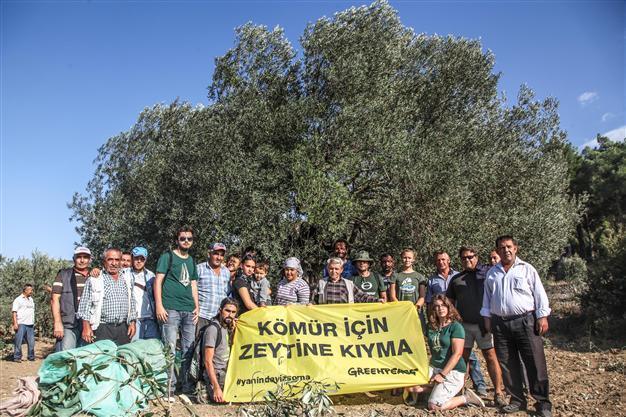Turkish court suspends regulation opening olive groves for energy facilities
ANKARA

The new law recently sparked angry protests in Soma. DHA Photo
Turkey’s Council of State ordered a stay of execution Oct. 28 for a controversial change in regulation that opened olive groves across the country for the construction of energy facilities, amid disputes between local producers and energy firms looking to open new plants. However, a law draft that will guarantee opening olive groves for power plants, still awaits a parliamentary approval.The court argued that the provision contradicts the purpose of existing legislation, which protects olive groves and aims to increase the production of olives.
The new law has recently sparked staunch protests in Soma, the coal capital of the Aegean, which suffered the worst industrial disaster in Turkey's history in May, resulting in the deaths of 301 workers.
The construction company Kolin has been cutting down hundreds of olive trees to build a coal plant near the village of Yırca in Soma district, despite local opposition. Pictures of villagers being beaten and attacked with tear gas by guards hired by Kolin have prompted an outcry among activists.
Lawyers representing the olive producers who took the regulation to appeal said they would now file a complaint against companies that do not respect the decision by continuing to cut down olive trees.
“The ruling creates a precedent. There can’t be any plant or mine placed in an olive grove,” said lawyer Hüseyin Enis Dinçeroğlu.
Officials have said Turkey needs the measure despite the fact it meant the destruction of olive groves.
In a statement last July, the Energy Ministry said the bill was necessary for the construction of Turkey’s first nuclear plant, which is planned to be built in the southern coast.
The previous regulation only allowed the construction of renewable energy facilities at a distance of at least three kilometers from olive groves. The regulation, however, allows private investors to build energy facilities, including plants that run on fossil fuels, military defense facilities and any form of construction, even in centuries-old plantations.
Olive producers were unanimous in condemning the draft, saying it would not only damage the environment but also be a “death sentence” for olive groves, which are an important source of income in western Turkey.
















